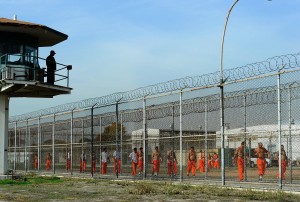But if perfection is not the test, he said, "at what level can the court, must the court say, Oh, yes, it's not perfect ... but it's good enough for government work? It's good enough for the Constitution's definition of what the government must do."
California Deputy Attorney General Patrick McKinney said that's exactly the position the state is now in.
"The state has never argued that the system is perfect or that it needs to be," he told the judge. "Federal oversight should not continue unless there is a violation of federal law."
Inmates' attorney Michael Bien disagreed: "We have established that there are ongoing constitutional violations" he told the judge.
California has spent more than $1 billion to build mental health facilities and increase salaries to hire more qualified mental health workers. The state now has more than 1,700 psychiatrists, psychologists, therapists, social workers and nurses to treat more than 32,000 mentally ill inmates. The state now spends $400 million annually on inmates' mental health care, McKinney told the judge.
Yet Bien said more mental health facilities must be built and staffed, while much more must be done to reduce a suicide rate that exceeds the national average for state and federal prisons and worsened last year.
"We're so far from anywhere near perfection, that's not the issue," Bien said outside the courtroom. "Things have gotten worse, not better."
The state contends that all the money, resources and effort it has invested in improving the mental health care system proves that it is no longer deliberately indifferent to the needs of mentally ill inmates.
"California has among the best prison mental health systems in the nation," Corrections Secretary Jeffrey Beard said in a statement after the hearing. "It's time to bring this intrusive and expensive lawsuit...to an end."
Ending the lawsuit is key to the Democratic governor's attempt to lift a separate court order over prison crowding that otherwise will force the state to reduce its inmate population by nearly 10,000 by year's end.
The order, upheld by the U.S. Supreme Court in 2011, prompted the state to enact Brown's so-called realignment law, which requires lower-level offenders to serve their sentences in county jails. Since then, the population of the state's 33 adult prisons has dropped by nearly 25,000 inmates to about 119,000.
Karlton said Wednesday that the current prison system is "a substantial improvement over what the court found when it found deliberate indifference initially."
The question is whether the state can prove that the level of care now being provided complies with the Constitution, he said.
Court-appointed experts and overseers recently said California still provides substandard care to inmates with mental and physical illnesses. However, experts hired by the state said 13 prisons they visited last year all provided acceptable mental health care.
Karlton could refuse to consider the reports by the state's experts because of what he called a "serious ethical violation."
Attorneys representing inmates complained that they were not notified and were not present when the experts interviewed their mentally ill clients, as required by ethical standards and a previous court order.
McKinney said a state expert had mentioned the interviews to one of the inmates' attorneys, and that the court-appointed special master was told that visits were planned.
"We disagree that this was done in secret," McKinney said.
"I don't want to raise my voice. Assume that I disagree with you. Assume that this is a profound ethical violation," the judge retorted during the 90-minute hearing.
Nonetheless, Karlton said he may still allow the state reports that form the core of the state's case because the issue is so important.
Karlton would have to rule on the request for renewed state control by early next month under a legal process Brown set in motion in January. However, he said that doesn't leave him time to question witnesses and gauge their credibility, so he is searching for a way to extend the deadline.
